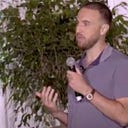Instigating Miracles
A Profile of Ken Denman
--
Last year Ken Denman’s appearance in my life created a beautiful — and uncommon — moment. I’ve been fortunate to celebrate many successes in my early years . . . and I’ve also felt the absence of other Black men at most of my journey’s new peaks. So I took notice when a Black man who co-founded a company and sold it to Apple, who is an investor at a leading firm and a veteran CEO, and who serves on multiple public company boards, including Costco, Motorola Solutions, and VMware, joined a board meeting early in my venture capital career. Ken has quickly become one of my most inspirational role models and mentors, and I am grateful to him for being the first in my new series Celebrating Black Founders and Investors.
“Risk-taking is a learned skill . . . . It may manifest itself in asking a question in a big meeting . . . it may be stepping forward and giving a presentation or speech. There are all these moments in life, many of them are formative; you get more confidence, you build more muscle memory. I often say that if people knew the series of minor miracles that occurred along the way that allow me to do what I do, I think they would be surprised. But some of those miracles are actually things you instigate. You actually have to step into the breach.”
Born in Memphis, Ken is the oldest of five boys. His parents were both born in Mississippi, but grew up and met in Memphis; the soundtrack of Ken’s childhood was soul music and jazz, with a particular affinity for Miles Davis.
Ken spent some of his formative years in Germany while his father was stationed there with the U.S. Army. As a precocious, curious nine-year-old on base, Ken wanted to go swimming at a nearby neighborhood pool, but his parents were too busy to take him. One day, he thought, “I am going to go see this damn swimming pool!” So he grabbed his swimsuit, boarded a public bus (telling the confused bus driver that his parents knew where he was going), and ventured off the base. He spent the day swimming with locals, who were curiously observing the novelty of a young Black boy swimming alone in a German neighborhood pool in the 1960s. On the long bus ride back to the base, Ken reflected on this early risk-taking, which would later develop into a key ingredient in his success: “It kind of formed a pattern that if you really want to do something, you kind of just step off the plank.”
While Ken was practicing early risk-taking, Ken’s mother was “the queen in a house with six men and a voice of caution and, frankly, continuous fear for our safety. She was terrified of the risks in raising five Black boys, of losing any of them to the myriad challenges that society presented.” She was clear to Ken, the oldest, that he had to be a role model for his brothers and that he could do or be anything he aspired to. At the same time, she cautioned due care, including “‘Don’t be bringing any babies home!’ And of course all the boys got ‘the talk’ about how to handle any interaction with the police.”
Ken‘s early years also included noticing and learning from those who were willing to take the biggest risks for the most important reasons. His experience of the Civil Rights Movement was atypical: he was living abroad at key moments. Ken remembers being in Germany and seeing that the Rev. Dr. Martin Luther King, Jr. had been assassinated in his hometown, which brought into focus what was happening in the United States. Ken also remembers Tommie Smith and John Carlos’ Black Power Salute at the 1968 Olympics. After seeing the athletes’ protest on TV, he and another child were pulled aside by a scoutmaster who cautioned them not to be inspired by the protest. But these words had the opposite effect, piquing Ken’s interest in the courage of his new Olympic role models and others, including Kareem Abdul-Jabbar.
Returning home to the United States, Ken and his family lived first in Memphis and then Fort Polk, Louisiana. Both were segregated. It was during those years when Ken’s ambition for business began to grow. Ken reflected, “I do remember that most of the merchants tended to be white, even in the Black communities, and that was curious to me. I was thinking ‘that doesn’t feel right,’ so in the preteen years I was beginning to sort out what success looks like and how to have a different impact.”
The family next followed his dad’s military career to Fort Lewis, Washington. Ken’s breakthroughs accelerated in the rainy Pacific Northwest. His teenage years included invitations that required clothes that stressed the family to afford, but that opened his eyes to a bigger world. One young lady invited Ken to play tennis at her family’s country club, and another invited him to a debutante ball at the Governor’s Mansion. “It just dawned on me that there’s a whole group of people living a completely different life than we were living, with other circumstances, other opportunities, and other perspectives that were available.” Ken decided, “I want to be successful. I don’t know exactly what that means, but I want to be successful and provide for my family and support my parents as they get older . . . I had an awareness that there was something different out there.”
While he received academic scholarship offers elsewhere, Ken’s deep desire to play college basketball led him to the school that wanted him as a basketball player, Central Washington University. He considered majors ranging from television production to physics. Alongside those early role models of Dr. King, Tommie Smith, and John Carlos, Ken’s father’s quiet leadership showed up repeatedly in his life. Ken thought back to a conversation with his father guiding him to choose a major: “I remember it vividly: he said ‘whatever you do just make sure that when you graduate you can get a job.’ For the blue collar world that he lived in . . . you get a degree, you get to work . . . so accounting was where I ended up.” And the accounting major indeed opened up a range of possibilities.
Ken described his father as a good man who was shy. Having grown up in the military, his father was unconsciously profane, which embarrassed him at times around the boys’ friends, making him even more reserved. For a man who barely finished high school, he often showed up with straightforward guidance, this time when Ken was thoughtfully weighing job offers. After learning that accounting firms paid less than the contract research-development organization that was recruiting him, the elder Denman saw the CRO offer as the obvious choice, dismissing any consideration of the accounting role, saying, “I thought you were smart.”
Ken followed his father’s advice, arriving at the CRO to find the executive leading the 2,400-person campus was a Black man, Dr. William Wiley. After getting to know Ken, Dr. Wiley added targeted advice to the foundation set by Ken’s father: “You shouldn’t be looking at the CFO job, you should be looking at my job.” This first business role model expanded Ken’s vision of what was possible: “The aperture was opened. I had several points in my career where I didn’t have a lot of perspective, and I was able to keep getting the aperture opened to where there really were no limitations.” Dr. Wiley inspired Ken’s decision to get an MBA at the University of Washington so that he could get “broader shoulders” and not be pigeonholed just in finance.
Ken told me that a key mantra of his, which he still tells himself when struggling with an issue or needing to calm himself, is “It’ll be fine.” The phrase resonated even more deeply as I learned of the difficult and defining season he walked through in 2011 and 2012, including losing his 20-year-old daughter in a tragic accident, losing his mother soon after, and suffering a subdural hematoma later repaired by brain surgery after being attacked in New York City. That year Ken resigned his role as CEO of Openwave to be with his family. He describes particularly the loss of his daughter as a hole that never can be filled, but he credits love, prayer, kindness, and patience of family and friends who walked with him and his wife of 30 years, Mary, through that time.
In a poetic turn that evokes the Book of Isaiah’s concept of beauty from ashes, it was in this emotional season that a close friend, Seth Neiman, a successful venture capitalist, helped to draw Ken out of his grief by “putting his arm around” him with a simple invitation: “Let’s talk about the next project.” Over dinner and several tequilas, they discussed the idea for Emotient, which used artificial intelligence to infer emotion from facial expression.
Just a few years later, they sold Emotient to Apple.
Since that sale, Ken has focused on maximizing his impact, including supporting the next generation of entrepreneurs as an investor and mentor and guiding major CEOs as a public company board member. He has sought to touch many different teams, people, experiences, opportunities, and vertical segments, both to contribute and to learn. He says that now “one of [his] passions is working with bright young people who are ambitious, thoughtful, [and] smart” — which keeps him young.
Through it all, Ken reflected on the deep importance of his family and friends in his journey and reminded me that while all paths are unique, he believes that one key is to summon the courage to take risks. Ken encouraged me to “have confidence to step into situations that you’re uncomfortable with, that feel risky or dangerous, have the confidence to overcome the imposter syndrome that most all of us feel sometimes. The confidence is in the risk-taking, and learning from those situations is the key to life.”
I can’t overstate the blessing it is to know and learn from Ken: an adventurous nine-year-old swimmer who was inspired by an Olympic protest, who was protected by his firm and loving mother and guided by his soldier father at key decision points, and then rose from the loss of his daughter to build a company and sell it to the world’s most iconic technology firm.
When I later listened to the entirety of my conversation with Ken, his voice felt so powerful that it inspired me to push forward with my vision to turn this series into a podcast. You can follow me on Twitter or LinkedIn to hear our entire discussion and see those next steps unfold.
Prime Movers Lab invests in breakthrough scientific startups founded by Prime Movers, the inventors who transform billions of lives. We invest in companies reinventing energy, transportation, infrastructure, manufacturing, human augmentation, and agriculture.
Sign up here if you are not already subscribed to our blog.

